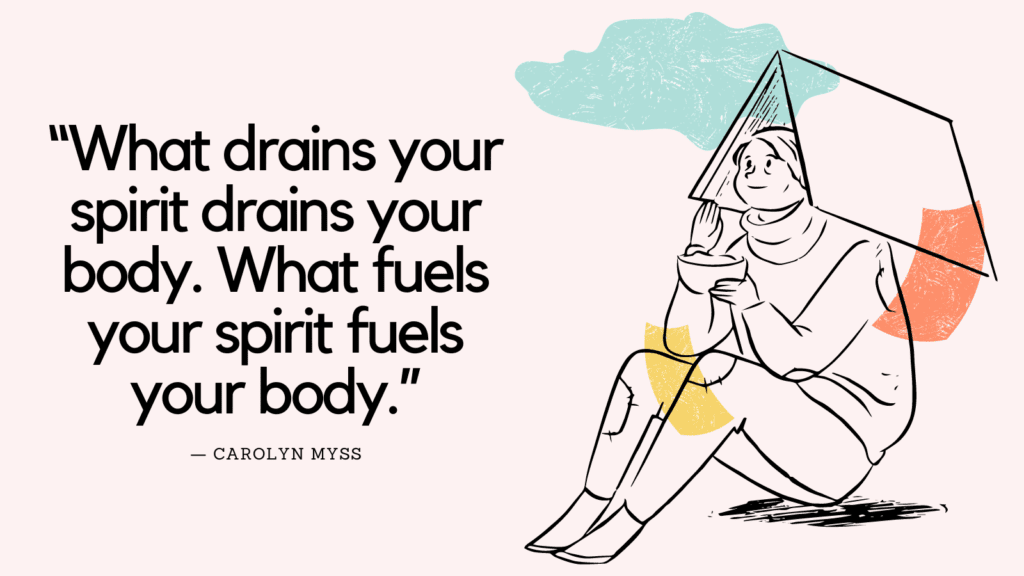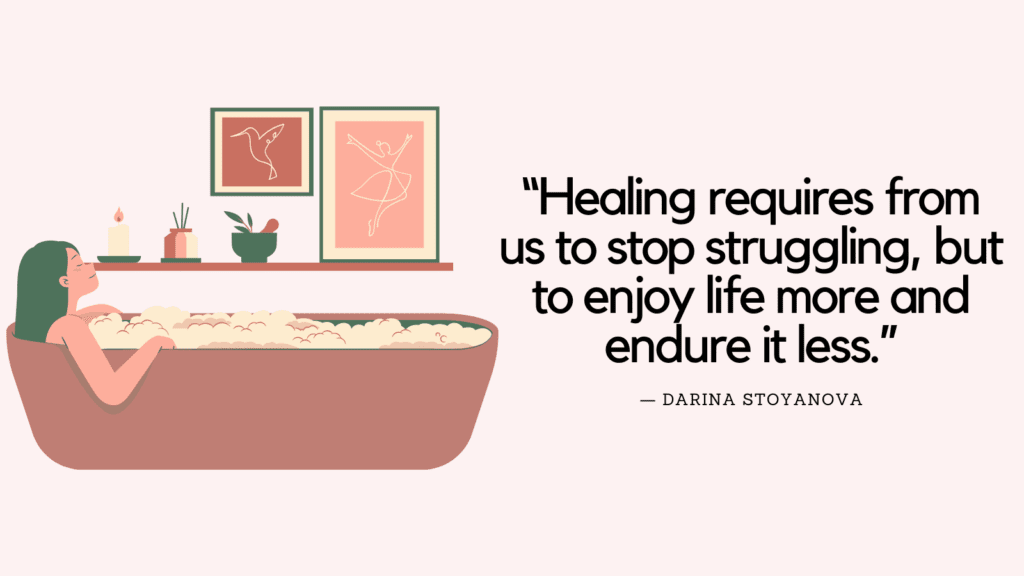This post contains eating disorder journal prompts to help you on your recovery journey.
What Are Journal Prompts?
Journal prompts are questions or ideas that are designed to inspire you to write in your journal.
They can be open-ended questions, thought-provoking statements, or creative exercises that encourage self-reflection, mindfulness, and personal growth.
Journal prompts can help you explore your thoughts, feelings, and experiences more deeply, and provide a safe space for self-expression and self-discovery.
Eating Disorder Journal Prompts
- What thoughts about food showed up today?
- What thoughts about your body showed up today?
- When did urges feel strongest today?
- What was happening right before those urges appeared?
- What emotions were present when eating felt hard?
- What emotions were present when eating felt easier?
- What rules about food are loudest right now?
- Where do those rules come from?
- What happens emotionally when you follow those rules?
- What happens emotionally when you break them?
- What does your eating disorder promise you?
- What does it actually take from you?
- How does it affect your mood day to day?
- How does it affect your relationships?
- How does it affect your energy and focus?
- What fears come up around eating regularly?
- What fears come up around feeling full?
- What fears come up around feeling hungry?
- What do you believe hunger says about you?
- What do you believe fullness says about you?
- What situations trigger comparison most?
- Who do you compare yourself to most often?
- What do you assume they have that you don’t?
- What evidence challenges that assumption?
- What body checking behaviors show up for you?
- What emotions follow those behaviors?
- What happens when you try to resist checking?
- What does the urge want immediate relief from?
- What feeling is hardest to tolerate without control?
- What does control give you emotionally?
- What feels unsafe about letting go of control?
- What feels exhausting about holding onto it?
- What does the eating disorder help you avoid feeling?
- What feelings might surface without it?
- What parts of life feel overwhelming right now?
- How does food become tied to those pressures?
- What does “good” or “bad” food mean to you?
- Who taught you those labels?
- How do those labels affect your choices?
- What would neutrality around food change?
- What does your inner critic say most often?
- Whose voice does it sound like?
- What does that voice want you to believe?
- What would a more realistic voice say instead?
- What shame shows up around eating?
- What shame shows up around your body?
- What happens when you try to hide those feelings?
- What happens when you name them honestly?
- What does your body ask for that you resist?
- What do you fear would happen if you listened?
- What signals from your body do you notice most?
- What signals do you ignore?
- Why do you think you ignore them?
- What has ignoring them cost you?
- What has listening helped with in the past?
- What beliefs do you have about worth and eating?
- What beliefs do you have about discipline and value?
- Where did those beliefs come from?
- What parts of you feel unseen outside of food and body?
- What needs more attention than appearance right now?
- What moments today felt peaceful around food or body?
- What made those moments possible?
- What moments felt most distressing?
- What support would have helped then?
- What do you do after a “bad” eating day?
- How does that response affect the next day?
- What would a less punishing response look like?
- What feels hardest about recovery or change?
- What feels relieving about the idea of change?
- What are you afraid you would lose without the disorder?
- What are you afraid you would gain without it?
- What does safety mean to you right now?
- What helps you feel slightly safer in your body?
- What makes things feel more threatening?
- What boundaries would support healing?
- What boundaries feel impossible right now?
- What kind of support do you resist accepting?
- Why do you think that is?
- What kind of support actually helps you?
- Who could offer that support?
- What progress do you dismiss too quickly?
- What effort are you not giving yourself credit for?
- What does recovery mean to you personally?
- What does it not mean?
- What would “better” look like, not perfect?
- What scares you about being seen as you are?
- What parts of you exist beyond food and body?
- What brings meaning or purpose outside of control?
- What do you want your life to include more of?
- What do you want it to include less of?
- What have you already survived that proves strength?
- What coping skills have helped even a little?
- What makes urges stronger for you?
- What helps them pass over time?
- What does self-respect look like around eating today?
- What does self-respect look like around rest today?
- What truth are you avoiding writing down?
- What would being honest with yourself change?
- What is one compassionate choice you could make today?
- What do you want your relationship with food and your body to become?

Benefits of Using Eating Disorder Journal Prompts
There are a number of potential benefits to using eating disorder journal prompts, including:
1. Increased Self-Reflection: Eating disorder journal prompts can help you take time for self-reflection by providing thought-provoking questions that encourage introspection and self-awareness.
2. Recognizing Triggers: By answering journal prompts, you may start to see patterns in your behaviors and identify triggers that contribute to your eating disorder symptoms.
3. Improved Self-Awareness: As you reflect on your thoughts and feelings through journaling, you may gain a better understanding of how your eating disorder affects you and learn to recognize the signs of an oncoming episode.
4. Positive Coping Strategies: Journaling can help you develop positive coping strategies to manage stressful situations or difficult emotions instead of using disordered eating behaviors to cope.
5. Accountability: Writing in a journal can help you hold yourself accountable for your recovery goals and track your progress towards them.
6. Connection with Others: Sharing your journal entries with a therapist, support group, or trusted friend can provide an opportunity for connection and support as you work towards recovery.
Related: Top 25 Self-Reflection Journal Prompts
How to Use Eating Disorder Journal Prompts?
Here’s how to use them effectively:
1. Set aside time: Schedule a designated time each day or week to sit down and write in your journal.
2. Choose a prompt: Pick a prompt that resonates with you or one that addresses a specific issue or emotion you are experiencing.
3. Write freely: Allow yourself to write freely without judgment or censorship. Write down whatever comes to mind, even if it doesn’t seem coherent or organized.
4. Reflect: After writing, take a few moments to reflect on what you’ve written. Think about how your thoughts and emotions have evolved and consider any insights or patterns you’ve noticed.
5. Take action: Use your journal as a tool to track your progress, set goals, and develop healthier habits.
Related: Best 10 Self Discovery Books
Conclusion
Eating disorder journal prompts can be helpful in navigating and understanding your thoughts and emotions around food, body image, self-esteem, and other related issues.
Remember, journaling can be a helpful tool in managing eating disorders, but it’s important to seek professional help if you’re struggling.
Don’t hesitate to reach out to a therapist or mental health professional who specializes in eating disorders for support and guidance.



